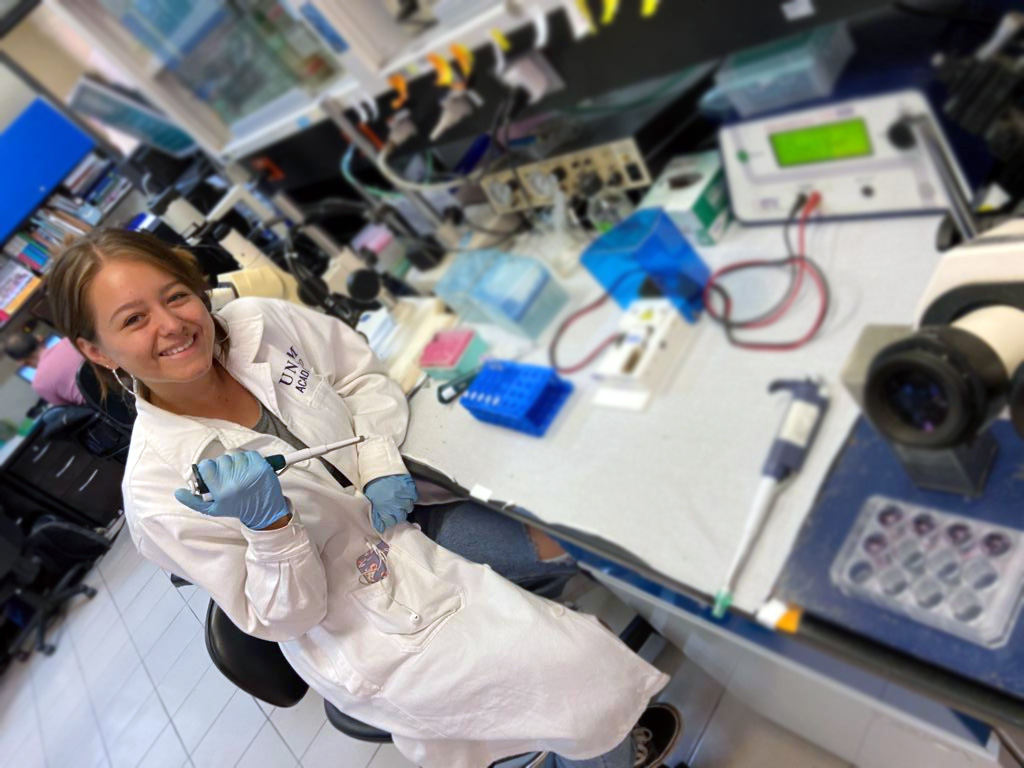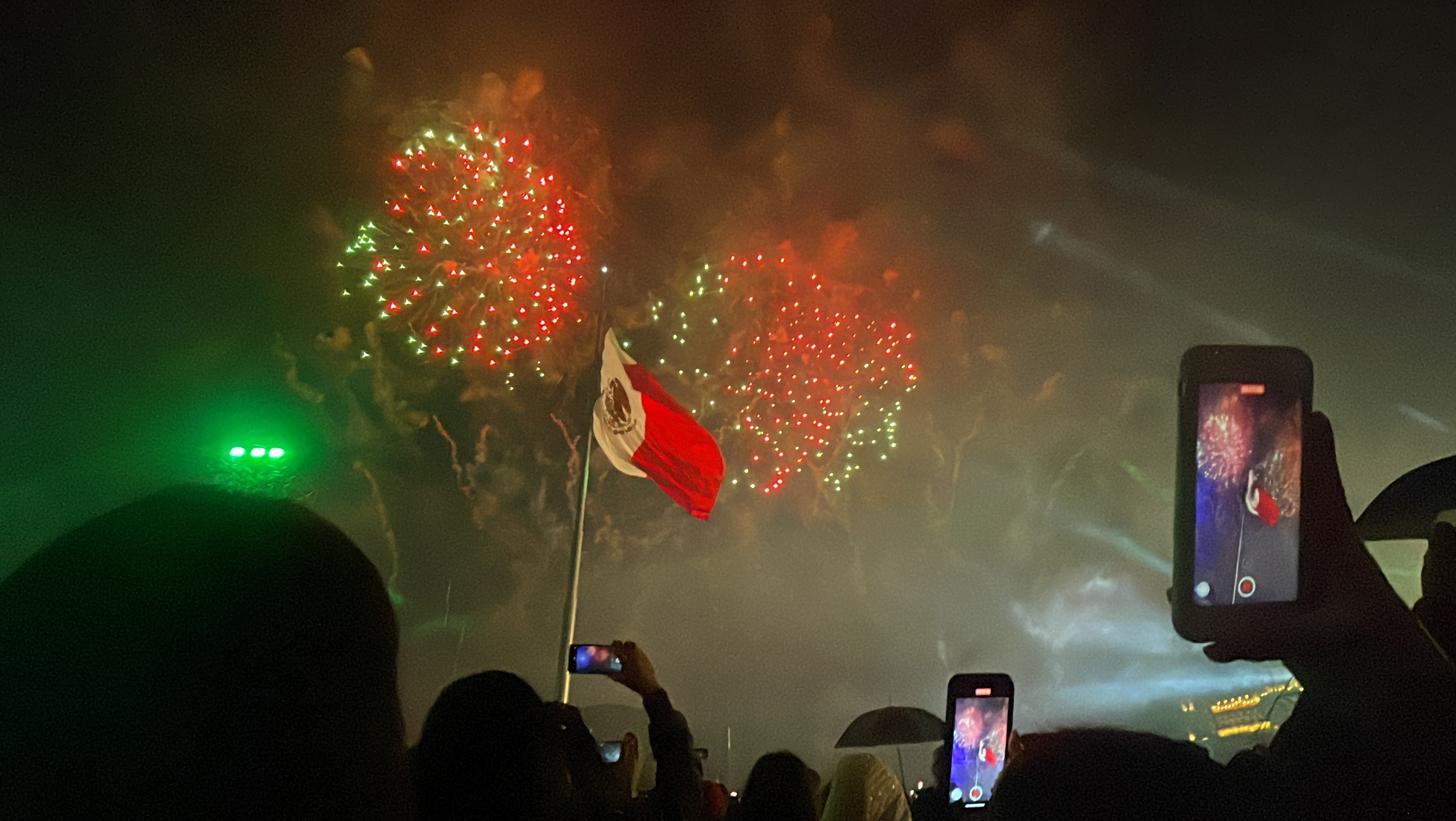Madison Marie Easton, born and raised in Gilbert, is a senior majoring in biological sciences and Spanish with a minor in photojournalism. She recently studied abroad in Mexico, in both Mexico City and Querétaro, as part of the Interdisciplinary Global Program (IGP). She shares her experiences from the past year—the food she still dreams about, the defining moment she witnessed on a bus and the new direction she’s taking after returning to the U.S.
Where did you study and why did you choose this particular country for your study abroad program?
I chose to study in Mexico because I felt a deep desire to get to know my neighboring country. I grew up in Arizona and felt that Mexico was so close yet so far to me, and I knew that before I graduated with plans to see many countries across the world, I wanted to get to know the one just a border away. I loved the culture, the music, the food, the people, the community mindset, and I wanted to immerse myself in what some research says is, “the purest form of Spanish in the world.” Albeit cliché, I also always wanted to live in a big city, and Mexico City is one of the most populous cities in the world!
What class(es) or research did you complete while abroad and for how long?
I spent my first semester in an intensive Spanish program where I studied grammar, linguistics and Mexican culture focused on popular art and post-Hispanic architecture throughout Mexico. In my second semester I was hired at the Institute of Neurobiology and moved to the neighboring state of Querétaro where I did research on the regenerative capabilities of garden slugs in the lab of Alfredo Varela, my mentor. In this lab I practiced cellular cultivation, DNA analysis and methods of transfection. I was also able to take classes on bioinformatics, stem cells and a boxing class taught by a local Lucha Libre star.
How did you fund your study abroad experience?
Because of the pretty drastic difference in cost of living between the U.S. and Mexico, I was able to work hard leading up to my year abroad and the money I raised lasted me the entire time. I am forever grateful that, despite their fears, my parents financially supported me whenever I was in a slump to afford groceries or a late-night ride home. Since I went abroad on a direct exchange, I was able to use my Lumberjack scholarship to cover my tuition during this year abroad.
What was your language-learning process? Can you tell us about a humorous language-related situation you encountered?

I had studied Spanish since high school, but I was never able to surpass a certain level, what they refer to in the linguistics world as a “learning plateau.” I knew that I wanted to acquire another language and to do so I would have to immerse myself so that I could achieve (maybe “access” the final level?) that final level and become confident in my abilities.
Within the IGP program, students more often enter their country of choice and take classes in the faculty of their primary degree, in my case biology, but UNAM denied me entry because my Spanish comprehension level was too low. I was so frustrated with this outcome, feeling behind my peers, and forced to enroll in an intensive language program. Despite learning alongside mainly Koreans and Japanese students who spoke just as much Spanish as I did, I was able to befriend other international students who only spoke Spanish, students from Peru, Colombia, Spain and Argentina.
Being brave, friendly and willing to make mistakes and laugh them off is what allowed my Spanish to flourish. I’ll never forget my first day when I left the safety of my new home to find food and wound up asking a waitress if the salsa was “caliente”… In a popular language full of cultural slang and accents I’m sure that my friends have burned into their memories my face of confusion whenever they would say a word or phrase that I was unfamiliar with.
My proudest moment I will say was a week out from my return to the U.S. A group of friends and I got together with corner store snacks and pizzas, and we all chatted together as a final goodbye. As conversations overlapped, voices became sleepy, and I told stories that got everyone to giggle. I realized that I had achieved my goal, I felt fluent, and I felt at my core that I was now a Spanish speaker.
What aspects of your host country do you find the most different than your home country, and why?
After living in two different states in Mexico and traveling throughout some more, I noticed that aspects of life and how people are treated is variable, but above all else, I felt like there was a strong national sense of community. There was a pride for one’s country, much like the U.S. with flags and jerseys, anthems and Independence days, but it felt unique.
I often hear stories of people from the U.S. being treated poorly in foreign countries, but I felt as though everyone I met throughout Mexico was willing to help. They wanted to share their culture and their pride and were willing to help a confused and overwhelmed 20-year-old girl in any way.
Public transport is a weird interest of mine. Any new city I go to I want to figure out the intricacies, the maps, the courtesies of public transportation, and in Mexico City, it is a big deal from the privately owned combis to the metro. I will never forget cramming myself onto a bus en route to the university, shoved into the back, unable to pay for my ticket. I wasn’t sure how to pay if I couldn’t even reach the driver, and then I witnessed as people began to hand their 2-peso fee up to the driver. The coins passed from person to person in the claustrophobic bus and just as soon as they left, the tickets made their way back to the exact riders. Such a tiny detail, and after hearing of the frequent robberies and assaults on public transport I felt heartened, bearing witness to a nuance of the community, a silent agreement, something I had never seen anywhere in the U.S.
Tell us about your favorite—and/or least favorite—dish abroad.
Now that a year has passed, there are several dishes I miss from Mexico. Despite how lucky we are in Arizona to have some quality authentic, Mexican food, no one does tacos al pastor like the streets of CDMX. In fact, all tacos within that city, be it chorizo, tripe or beef are unlike any other. Maybe the flavoring comes from love, maybe from the city air. I also visited Oaxaca where I got to try tejate, an energizing powdery drink of corn and cocoa that I still have dreams about. Other honorable mentions include chilaquiles (verdes personally), mollequiles, tostadas de tinga, marquesitas, the iconic “Kitty-chelas” from Tepito, café de olla and so many more. Although the common association with a foreigner in Mexico is the inevitable stomach sickness, I only became ill once when I had shrimp tacos in a mountain town in southern Mexico.
How has this study abroad experience influenced your personal, academic and career goals? Has it opened up new possibilities or changed your direction?

I always had a love-hate relationship with the field of biology. Ever since junior high I thought that I was bad luck in a laboratory. Data and numbers, an essential aspect of the field, easily become scrambled in my brain. An article every now and then piques my interest, but I so often felt directionless. While abroad I worked in a lab, 40 hours a week, from February to the end of May, and I proved to myself that I’m not bad luck in a lab. I can understand data and numbers, I can be prosperous in my experiments and learn from the work of others, but it cemented that this path isn’t for me. The next great scientific development found by a curious mind in a white coat will not be me, and that’s OK.
If anything, my time abroad felt like a reset, as if my brain was taken out of my skull and run through a washing machine. I remembered who I really am, at least the fundamental version of myself. With limited vocabulary in a city of possibilities filled with millions of unique people, I felt ignited with the passion of the person I once was, of who I always had been. The ability to meet a stranger, in a completely different field, from an entirely different background and upbringing, different views, different language, different passport, and have a meal and a few drinks, listen to their stories and share a few laughs. I remembered that this is what fuels my soul. After years of chasing the labs, the research publications, the scholastic titles, I reminded myself of my willingness and passion to be a listener, and a storyteller and a companion. By studying abroad, by being, for once in my life, entirely alone and then suddenly surrounded by new people, by saying “yes” to everything and diving headfirst into the unknown, I was able to come face to face with the person I was always meant to be. From then on I knew I would be chasing that feeling across the globe, starting with my own home of Arizona, with the people who surround me in lecture and at work.




